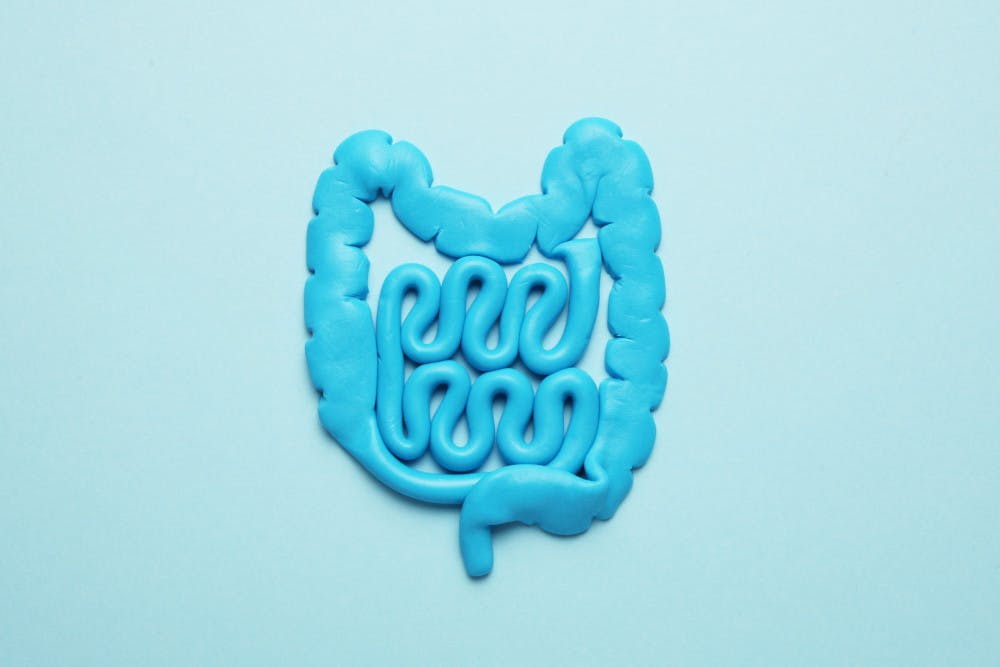Leaky gut symptoms, causes, and solutions
Can a leaky gut repair itself? And what are the symptoms? Learn how to recognise a leaky gut and what to do about it.


Your gut may seem completely separate from your brain, but your digestive system has significant implications on your brain health and your mental health. And many people have no idea that they have leaky gut symptoms.
In this guide, we’ll explore what leaky gut syndrome is, what the symptoms of leaky gut are, and how to give your gut the love and care it needs to thrive.
What is leaky gut syndrome?
Your gut includes more than 4,000 square feet of intestinal surface area. This intestinal lining creates a barrier between the food you're digesting, and your bloodstream and the rest of your body.
On a basic level, a leaky gut is when this intestinal lining has holes, breaks, or gaps that compromise this gut barrier. This allows whatever you eat, from toxins to parasites to specific food compounds (like sugar or gluten) to pass into your bloodstream.
When these things pass into your bloodstream, Harvard Medical School warns that these substances can trigger an immune response, inflammation, and other negative reactions. A leaky gut is also associated with everything from an increased risk of diabetes to higher rates of food allergies.
And one of the most remarkable parts? According to Harvard’s doctors, “we all have some degree of leaky gut.”
Leaky gut syndrome symptoms

Still, even if we all experience it in some form, it clearly affects some people more than others, so it’s important to know, and recognize, what are symptoms of leaky gut.
Some of the most widely reported symptoms of leaky gut, also clinically known as intestinal permeability, include:
Food sensitivities, such as lactose intolerance or gluten allergies
Fatigue and low energy levels
Bloating and feeling full all the time
Skin problems, such as allergies, eczema, and psoriasis
There is also a growing concern that a leaky gut is correlated with rising levels of mental health concerns. Your gut is your body’s so-called second brain, and your gut is closely linked with healthy levels of neurotransmitters, brain chemicals, and endorphins.
Poor gut health may therefore have a direct impact on your mental health.
What is the main cause of leaky gut?
Because the traditional medical field still hasn’t reached a full consensus on what causes leaky gut syndrome, there are many conflicting studies. Yet out of this still-growing body of research, a clear picture begins to emerge of the main causes of a leaky gut.
Causes of a leaky gut can include:
Eating too much sugar, which breaks down your intestinal wall
Drinking alcohol
Poor diet or nutrition, especially a lack in zinc, vitamin A and vitamin D
A high-intensity lifestyle causing tension
Get your Brain Health Score in 4 minutes
Take the quizHow do you fix a leaky gut?
Follow these tips for leaky gut prevention and treatment.
1. Improve your diet
A gut-friendly diet can help soothe an injured gut, or prevent more injuries from occurring in your intestinal barrier. It’s one of the simplest forms of treatment for leaky gut. In general, you want to:
Reduce, or eliminate, your intake of added sugar.
Eat high-fiber plant-based foods, such as legumes, grains, and leafy greens.
Eat more fermented foods, which help restore your gut health and balance your gut’s bacteria populations.
Add prebiotic foods to each meal.
Ensure your diet is full of the best foods for gut health.
While more research is needed, many people experiencing the signs of a leaky gut will often eliminate or restrict the following food groups:
Dairy
Refined oils
Artificial sweeteners
Processed meats
Gluten and all wheat-based products
2. Adjust your lifestyle habits
While you might not be able to see your gut, it responds to your daily, external habits. So for another means of treatment for leaky gut syndrome, consider:
Exercising daily.
Reducing or eliminating smoking and drinking alcohol.
Practicing mindfulness, meditation, and other practices that help you feeling calm.
3. Rethink your leaky gut supplements
Many people immediately run to probiotics when it comes to gut health. And while probiotics are shown to improve gastrointestinal concerns, they’re only one aspect of nutrition.
New research hints that specific vitamins, minerals, and antioxidants may help to support real gut health and heal a leaky gut. These include:
Zinc, which may strengthen your gut lining while reducing gut permeability.
L-glutamine, an amino acid that may strengthen the cells in your intestinal tract.
Curcumin, the active compound in turmeric that may reduce inflammation in your gut.
So, how do I heal my gut?
If you’re worried about the health of your gut, don’t forget a daily multivitamin. Supplements for a leaky gut can help fill in the nutritional gaps in your diet, ensuring a healthy and robust microbiome.